Concepts of Recovery in Mental Health: Maori Population Analysis
VerifiedAdded on 2022/09/17
|20
|6317
|32
Report
AI Summary
This report provides a comprehensive literature review on mental health issues within the Maori population of New Zealand. It explores the historical and socio-political influences on recovery, including the impact of colonization and cultural identity. The paper defines recovery in mental health, contrasting clinical and personal perspectives, and examines key concepts such as social involvement, empowerment, hope, identity, and meaning. It analyzes philosophical and theoretical frameworks, including Te Whare Tapa Wha, and discusses recovery approaches in practice. The report also addresses the implications, strengths, and gaps in the research, offering recommendations for future practice and research. It highlights the importance of Whanau ora and culturally sensitive approaches to improve mental health outcomes within the Maori community.
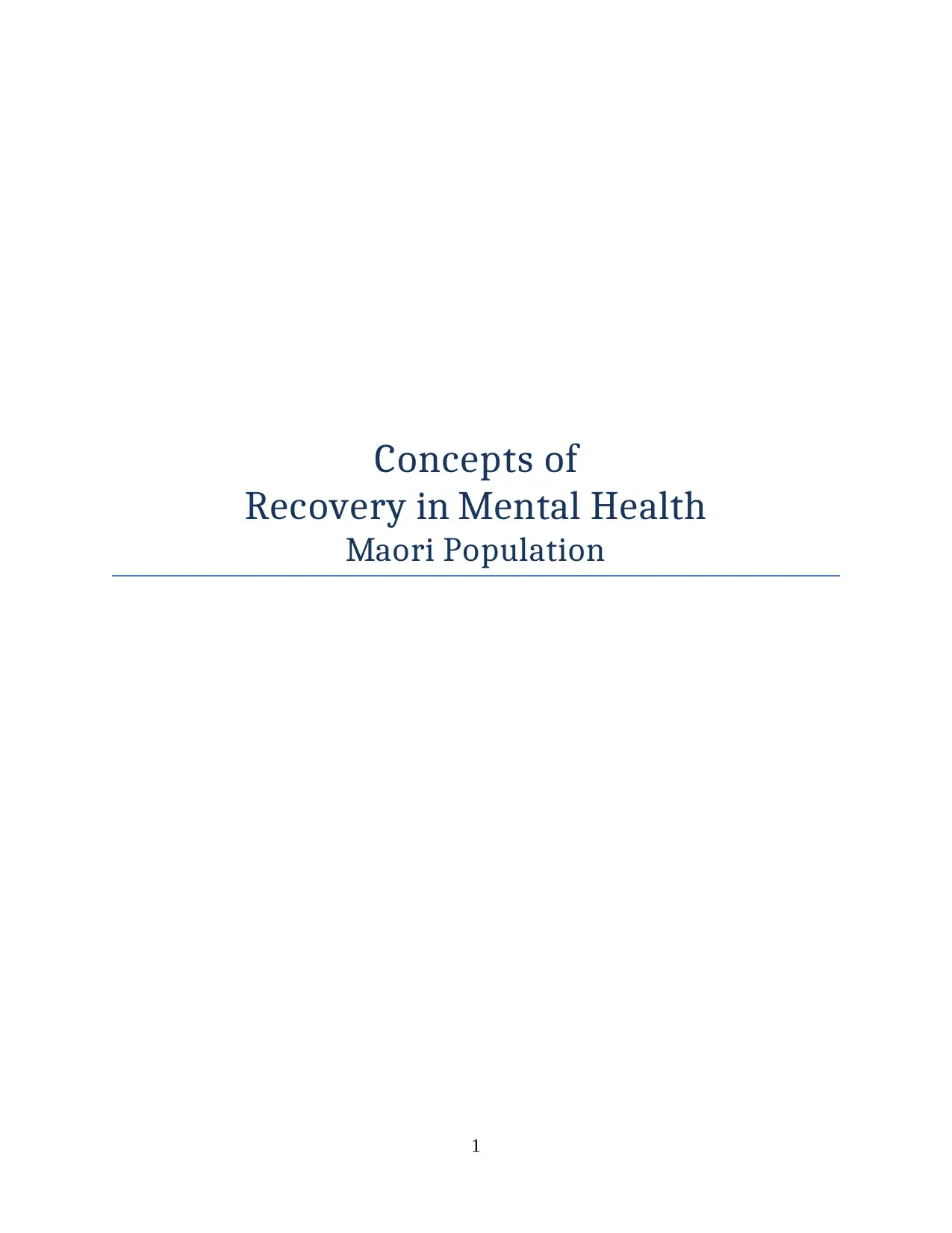
Concepts of
Recovery in Mental Health
Maori Population
1
Recovery in Mental Health
Maori Population
1
Paraphrase This Document
Need a fresh take? Get an instant paraphrase of this document with our AI Paraphraser
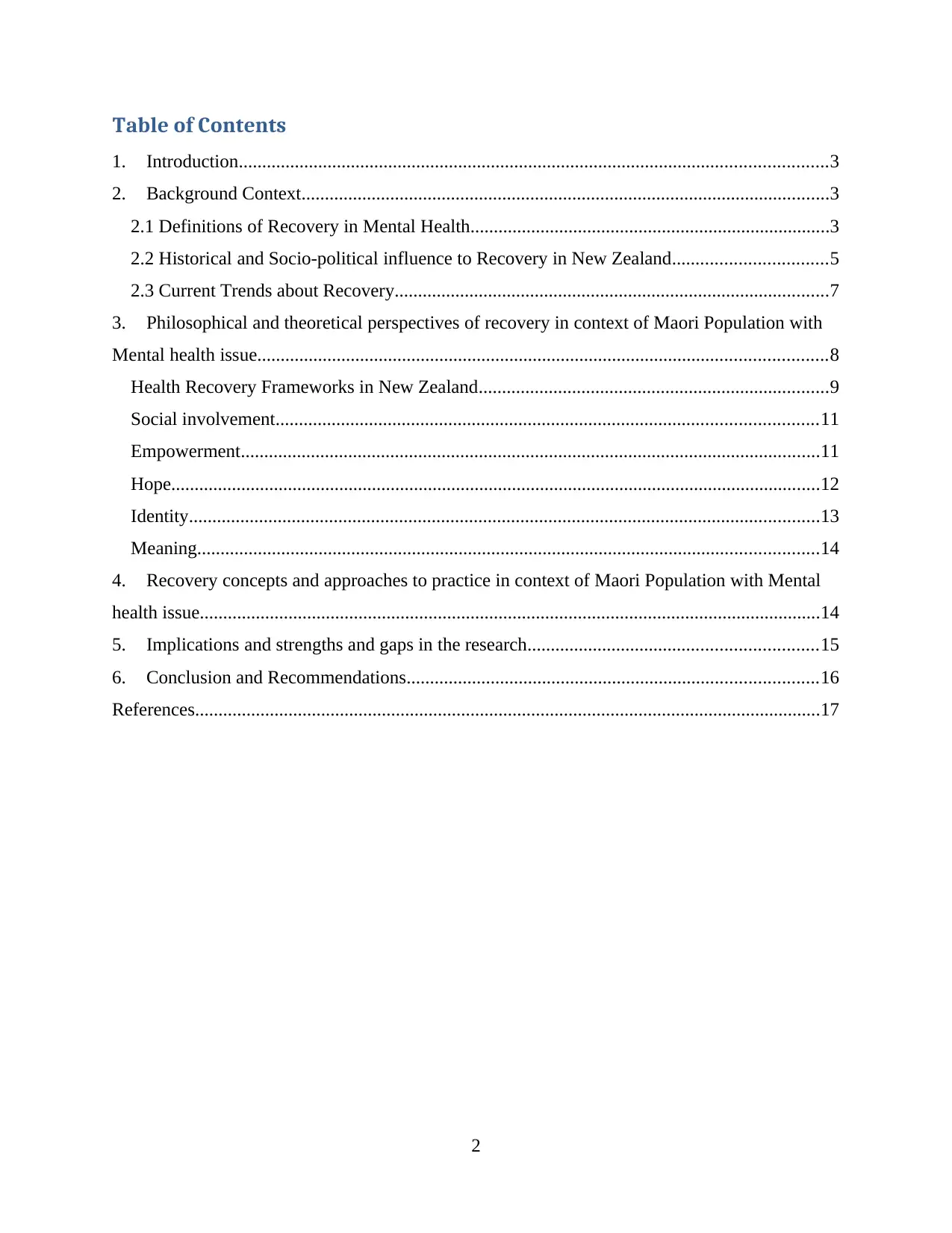
Table of Contents
1. Introduction..............................................................................................................................3
2. Background Context.................................................................................................................3
2.1 Definitions of Recovery in Mental Health.............................................................................3
2.2 Historical and Socio-political influence to Recovery in New Zealand.................................5
2.3 Current Trends about Recovery.............................................................................................7
3. Philosophical and theoretical perspectives of recovery in context of Maori Population with
Mental health issue..........................................................................................................................8
Health Recovery Frameworks in New Zealand...........................................................................9
Social involvement....................................................................................................................11
Empowerment............................................................................................................................11
Hope...........................................................................................................................................12
Identity.......................................................................................................................................13
Meaning.....................................................................................................................................14
4. Recovery concepts and approaches to practice in context of Maori Population with Mental
health issue.....................................................................................................................................14
5. Implications and strengths and gaps in the research..............................................................15
6. Conclusion and Recommendations........................................................................................16
References......................................................................................................................................17
2
1. Introduction..............................................................................................................................3
2. Background Context.................................................................................................................3
2.1 Definitions of Recovery in Mental Health.............................................................................3
2.2 Historical and Socio-political influence to Recovery in New Zealand.................................5
2.3 Current Trends about Recovery.............................................................................................7
3. Philosophical and theoretical perspectives of recovery in context of Maori Population with
Mental health issue..........................................................................................................................8
Health Recovery Frameworks in New Zealand...........................................................................9
Social involvement....................................................................................................................11
Empowerment............................................................................................................................11
Hope...........................................................................................................................................12
Identity.......................................................................................................................................13
Meaning.....................................................................................................................................14
4. Recovery concepts and approaches to practice in context of Maori Population with Mental
health issue.....................................................................................................................................14
5. Implications and strengths and gaps in the research..............................................................15
6. Conclusion and Recommendations........................................................................................16
References......................................................................................................................................17
2
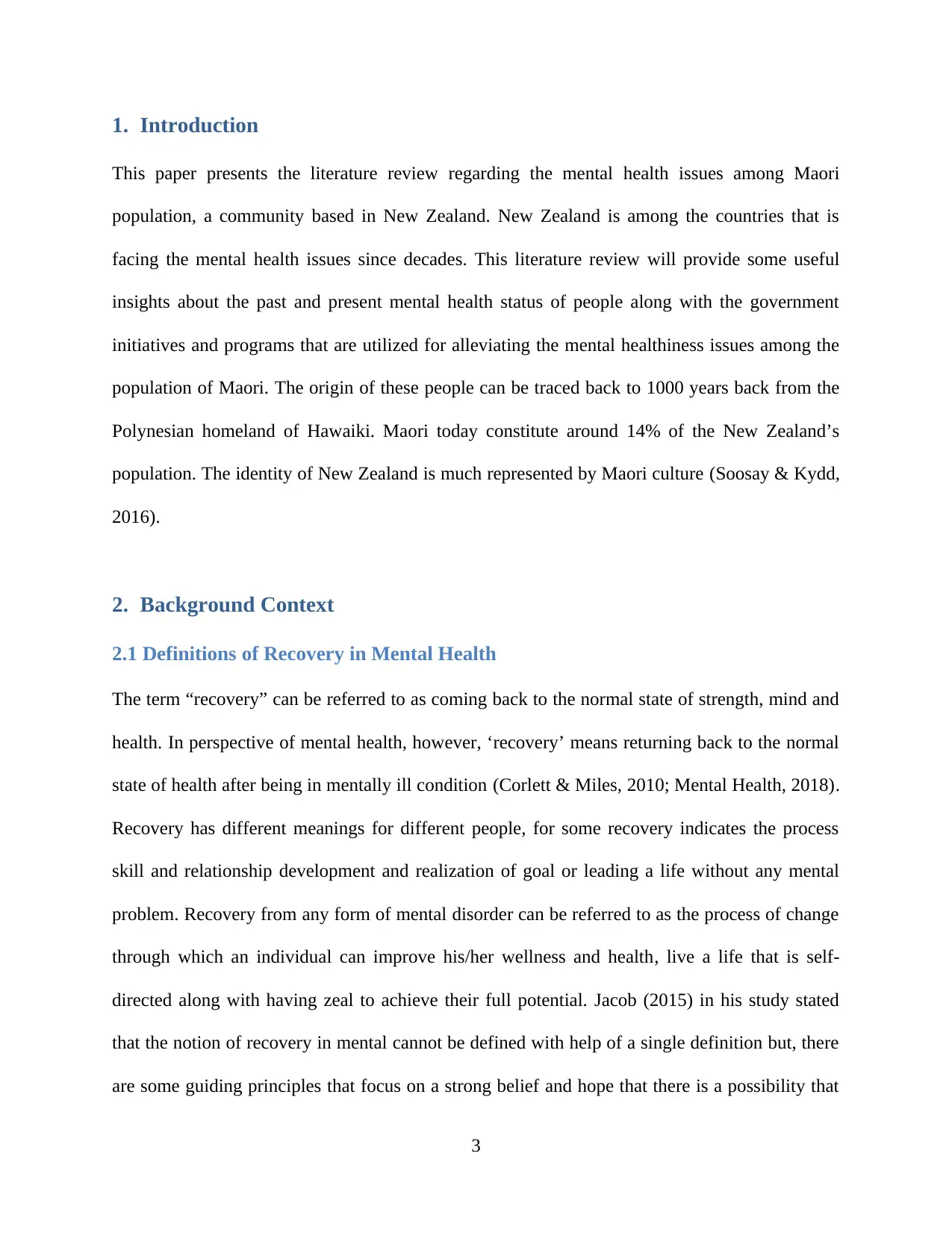
1. Introduction
This paper presents the literature review regarding the mental health issues among Maori
population, a community based in New Zealand. New Zealand is among the countries that is
facing the mental health issues since decades. This literature review will provide some useful
insights about the past and present mental health status of people along with the government
initiatives and programs that are utilized for alleviating the mental healthiness issues among the
population of Maori. The origin of these people can be traced back to 1000 years back from the
Polynesian homeland of Hawaiki. Maori today constitute around 14% of the New Zealand’s
population. The identity of New Zealand is much represented by Maori culture (Soosay & Kydd,
2016).
2. Background Context
2.1 Definitions of Recovery in Mental Health
The term “recovery” can be referred to as coming back to the normal state of strength, mind and
health. In perspective of mental health, however, ‘recovery’ means returning back to the normal
state of health after being in mentally ill condition (Corlett & Miles, 2010; Mental Health, 2018).
Recovery has different meanings for different people, for some recovery indicates the process
skill and relationship development and realization of goal or leading a life without any mental
problem. Recovery from any form of mental disorder can be referred to as the process of change
through which an individual can improve his/her wellness and health, live a life that is self-
directed along with having zeal to achieve their full potential. Jacob (2015) in his study stated
that the notion of recovery in mental cannot be defined with help of a single definition but, there
are some guiding principles that focus on a strong belief and hope that there is a possibility that
3
This paper presents the literature review regarding the mental health issues among Maori
population, a community based in New Zealand. New Zealand is among the countries that is
facing the mental health issues since decades. This literature review will provide some useful
insights about the past and present mental health status of people along with the government
initiatives and programs that are utilized for alleviating the mental healthiness issues among the
population of Maori. The origin of these people can be traced back to 1000 years back from the
Polynesian homeland of Hawaiki. Maori today constitute around 14% of the New Zealand’s
population. The identity of New Zealand is much represented by Maori culture (Soosay & Kydd,
2016).
2. Background Context
2.1 Definitions of Recovery in Mental Health
The term “recovery” can be referred to as coming back to the normal state of strength, mind and
health. In perspective of mental health, however, ‘recovery’ means returning back to the normal
state of health after being in mentally ill condition (Corlett & Miles, 2010; Mental Health, 2018).
Recovery has different meanings for different people, for some recovery indicates the process
skill and relationship development and realization of goal or leading a life without any mental
problem. Recovery from any form of mental disorder can be referred to as the process of change
through which an individual can improve his/her wellness and health, live a life that is self-
directed along with having zeal to achieve their full potential. Jacob (2015) in his study stated
that the notion of recovery in mental cannot be defined with help of a single definition but, there
are some guiding principles that focus on a strong belief and hope that there is a possibility that
3
⊘ This is a preview!⊘
Do you want full access?
Subscribe today to unlock all pages.

Trusted by 1+ million students worldwide
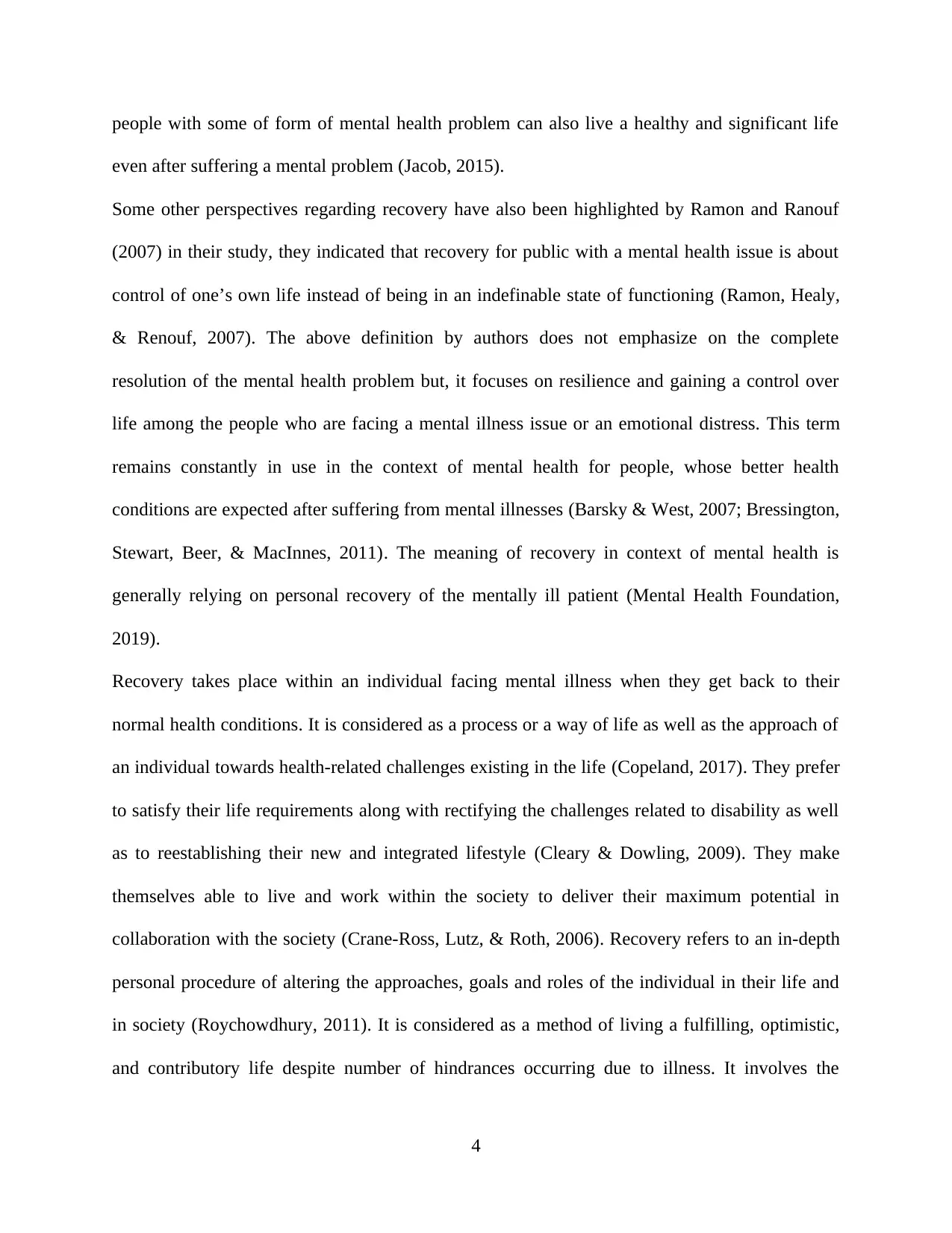
people with some of form of mental health problem can also live a healthy and significant life
even after suffering a mental problem (Jacob, 2015).
Some other perspectives regarding recovery have also been highlighted by Ramon and Ranouf
(2007) in their study, they indicated that recovery for public with a mental health issue is about
control of one’s own life instead of being in an indefinable state of functioning (Ramon, Healy,
& Renouf, 2007). The above definition by authors does not emphasize on the complete
resolution of the mental health problem but, it focuses on resilience and gaining a control over
life among the people who are facing a mental illness issue or an emotional distress. This term
remains constantly in use in the context of mental health for people, whose better health
conditions are expected after suffering from mental illnesses (Barsky & West, 2007; Bressington,
Stewart, Beer, & MacInnes, 2011). The meaning of recovery in context of mental health is
generally relying on personal recovery of the mentally ill patient (Mental Health Foundation,
2019).
Recovery takes place within an individual facing mental illness when they get back to their
normal health conditions. It is considered as a process or a way of life as well as the approach of
an individual towards health-related challenges existing in the life (Copeland, 2017). They prefer
to satisfy their life requirements along with rectifying the challenges related to disability as well
as to reestablishing their new and integrated lifestyle (Cleary & Dowling, 2009). They make
themselves able to live and work within the society to deliver their maximum potential in
collaboration with the society (Crane-Ross, Lutz, & Roth, 2006). Recovery refers to an in-depth
personal procedure of altering the approaches, goals and roles of the individual in their life and
in society (Roychowdhury, 2011). It is considered as a method of living a fulfilling, optimistic,
and contributory life despite number of hindrances occurring due to illness. It involves the
4
even after suffering a mental problem (Jacob, 2015).
Some other perspectives regarding recovery have also been highlighted by Ramon and Ranouf
(2007) in their study, they indicated that recovery for public with a mental health issue is about
control of one’s own life instead of being in an indefinable state of functioning (Ramon, Healy,
& Renouf, 2007). The above definition by authors does not emphasize on the complete
resolution of the mental health problem but, it focuses on resilience and gaining a control over
life among the people who are facing a mental illness issue or an emotional distress. This term
remains constantly in use in the context of mental health for people, whose better health
conditions are expected after suffering from mental illnesses (Barsky & West, 2007; Bressington,
Stewart, Beer, & MacInnes, 2011). The meaning of recovery in context of mental health is
generally relying on personal recovery of the mentally ill patient (Mental Health Foundation,
2019).
Recovery takes place within an individual facing mental illness when they get back to their
normal health conditions. It is considered as a process or a way of life as well as the approach of
an individual towards health-related challenges existing in the life (Copeland, 2017). They prefer
to satisfy their life requirements along with rectifying the challenges related to disability as well
as to reestablishing their new and integrated lifestyle (Cleary & Dowling, 2009). They make
themselves able to live and work within the society to deliver their maximum potential in
collaboration with the society (Crane-Ross, Lutz, & Roth, 2006). Recovery refers to an in-depth
personal procedure of altering the approaches, goals and roles of the individual in their life and
in society (Roychowdhury, 2011). It is considered as a method of living a fulfilling, optimistic,
and contributory life despite number of hindrances occurring due to illness. It involves the
4
Paraphrase This Document
Need a fresh take? Get an instant paraphrase of this document with our AI Paraphraser
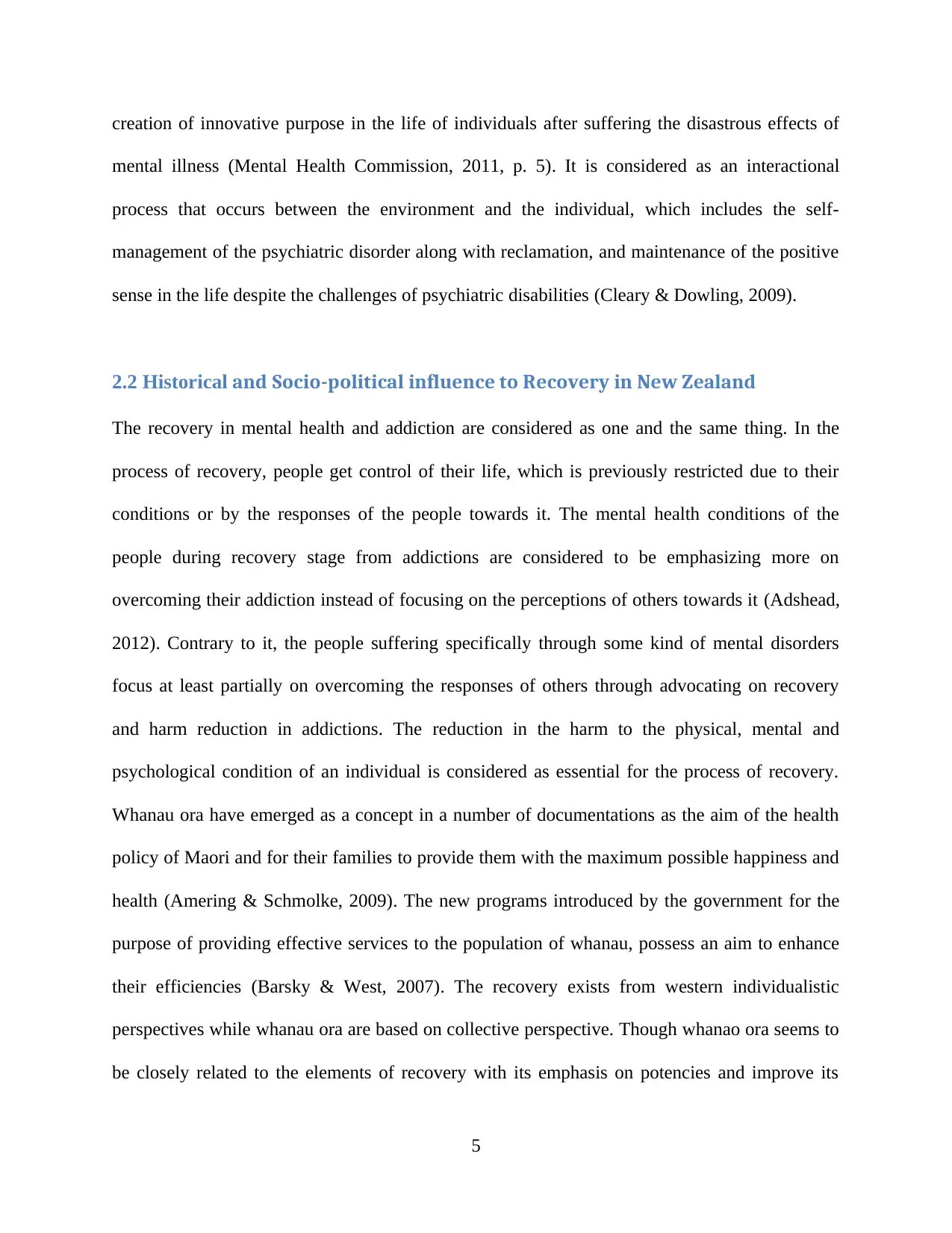
creation of innovative purpose in the life of individuals after suffering the disastrous effects of
mental illness (Mental Health Commission, 2011, p. 5). It is considered as an interactional
process that occurs between the environment and the individual, which includes the self-
management of the psychiatric disorder along with reclamation, and maintenance of the positive
sense in the life despite the challenges of psychiatric disabilities (Cleary & Dowling, 2009).
2.2 Historical and Socio-political influence to Recovery in New Zealand
The recovery in mental health and addiction are considered as one and the same thing. In the
process of recovery, people get control of their life, which is previously restricted due to their
conditions or by the responses of the people towards it. The mental health conditions of the
people during recovery stage from addictions are considered to be emphasizing more on
overcoming their addiction instead of focusing on the perceptions of others towards it (Adshead,
2012). Contrary to it, the people suffering specifically through some kind of mental disorders
focus at least partially on overcoming the responses of others through advocating on recovery
and harm reduction in addictions. The reduction in the harm to the physical, mental and
psychological condition of an individual is considered as essential for the process of recovery.
Whanau ora have emerged as a concept in a number of documentations as the aim of the health
policy of Maori and for their families to provide them with the maximum possible happiness and
health (Amering & Schmolke, 2009). The new programs introduced by the government for the
purpose of providing effective services to the population of whanau, possess an aim to enhance
their efficiencies (Barsky & West, 2007). The recovery exists from western individualistic
perspectives while whanau ora are based on collective perspective. Though whanao ora seems to
be closely related to the elements of recovery with its emphasis on potencies and improve its
5
mental illness (Mental Health Commission, 2011, p. 5). It is considered as an interactional
process that occurs between the environment and the individual, which includes the self-
management of the psychiatric disorder along with reclamation, and maintenance of the positive
sense in the life despite the challenges of psychiatric disabilities (Cleary & Dowling, 2009).
2.2 Historical and Socio-political influence to Recovery in New Zealand
The recovery in mental health and addiction are considered as one and the same thing. In the
process of recovery, people get control of their life, which is previously restricted due to their
conditions or by the responses of the people towards it. The mental health conditions of the
people during recovery stage from addictions are considered to be emphasizing more on
overcoming their addiction instead of focusing on the perceptions of others towards it (Adshead,
2012). Contrary to it, the people suffering specifically through some kind of mental disorders
focus at least partially on overcoming the responses of others through advocating on recovery
and harm reduction in addictions. The reduction in the harm to the physical, mental and
psychological condition of an individual is considered as essential for the process of recovery.
Whanau ora have emerged as a concept in a number of documentations as the aim of the health
policy of Maori and for their families to provide them with the maximum possible happiness and
health (Amering & Schmolke, 2009). The new programs introduced by the government for the
purpose of providing effective services to the population of whanau, possess an aim to enhance
their efficiencies (Barsky & West, 2007). The recovery exists from western individualistic
perspectives while whanau ora are based on collective perspective. Though whanao ora seems to
be closely related to the elements of recovery with its emphasis on potencies and improve its
5
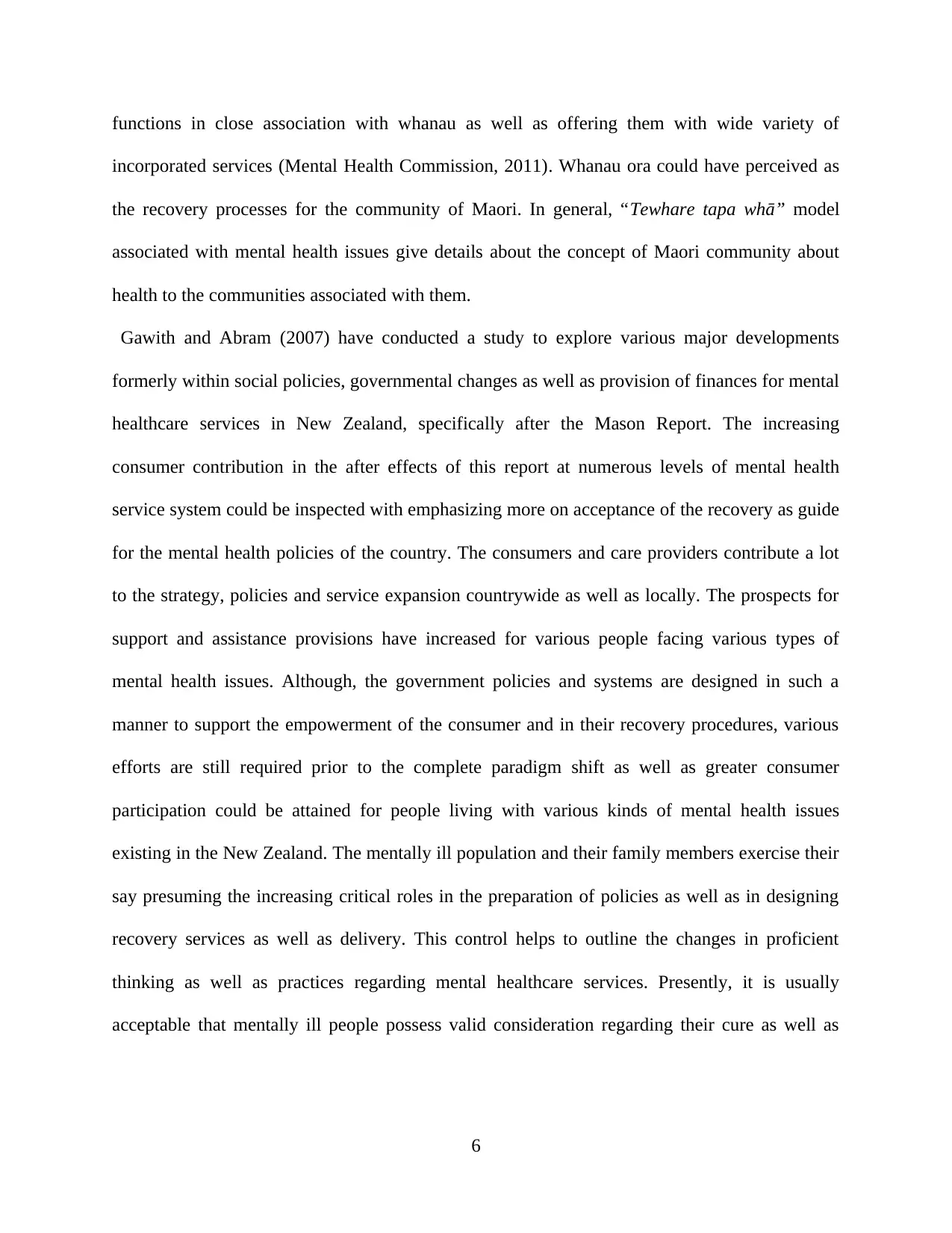
functions in close association with whanau as well as offering them with wide variety of
incorporated services (Mental Health Commission, 2011). Whanau ora could have perceived as
the recovery processes for the community of Maori. In general, “Tewhare tapa whā” model
associated with mental health issues give details about the concept of Maori community about
health to the communities associated with them.
Gawith and Abram (2007) have conducted a study to explore various major developments
formerly within social policies, governmental changes as well as provision of finances for mental
healthcare services in New Zealand, specifically after the Mason Report. The increasing
consumer contribution in the after effects of this report at numerous levels of mental health
service system could be inspected with emphasizing more on acceptance of the recovery as guide
for the mental health policies of the country. The consumers and care providers contribute a lot
to the strategy, policies and service expansion countrywide as well as locally. The prospects for
support and assistance provisions have increased for various people facing various types of
mental health issues. Although, the government policies and systems are designed in such a
manner to support the empowerment of the consumer and in their recovery procedures, various
efforts are still required prior to the complete paradigm shift as well as greater consumer
participation could be attained for people living with various kinds of mental health issues
existing in the New Zealand. The mentally ill population and their family members exercise their
say presuming the increasing critical roles in the preparation of policies as well as in designing
recovery services as well as delivery. This control helps to outline the changes in proficient
thinking as well as practices regarding mental healthcare services. Presently, it is usually
acceptable that mentally ill people possess valid consideration regarding their cure as well as
6
incorporated services (Mental Health Commission, 2011). Whanau ora could have perceived as
the recovery processes for the community of Maori. In general, “Tewhare tapa whā” model
associated with mental health issues give details about the concept of Maori community about
health to the communities associated with them.
Gawith and Abram (2007) have conducted a study to explore various major developments
formerly within social policies, governmental changes as well as provision of finances for mental
healthcare services in New Zealand, specifically after the Mason Report. The increasing
consumer contribution in the after effects of this report at numerous levels of mental health
service system could be inspected with emphasizing more on acceptance of the recovery as guide
for the mental health policies of the country. The consumers and care providers contribute a lot
to the strategy, policies and service expansion countrywide as well as locally. The prospects for
support and assistance provisions have increased for various people facing various types of
mental health issues. Although, the government policies and systems are designed in such a
manner to support the empowerment of the consumer and in their recovery procedures, various
efforts are still required prior to the complete paradigm shift as well as greater consumer
participation could be attained for people living with various kinds of mental health issues
existing in the New Zealand. The mentally ill population and their family members exercise their
say presuming the increasing critical roles in the preparation of policies as well as in designing
recovery services as well as delivery. This control helps to outline the changes in proficient
thinking as well as practices regarding mental healthcare services. Presently, it is usually
acceptable that mentally ill people possess valid consideration regarding their cure as well as
6
⊘ This is a preview!⊘
Do you want full access?
Subscribe today to unlock all pages.

Trusted by 1+ million students worldwide
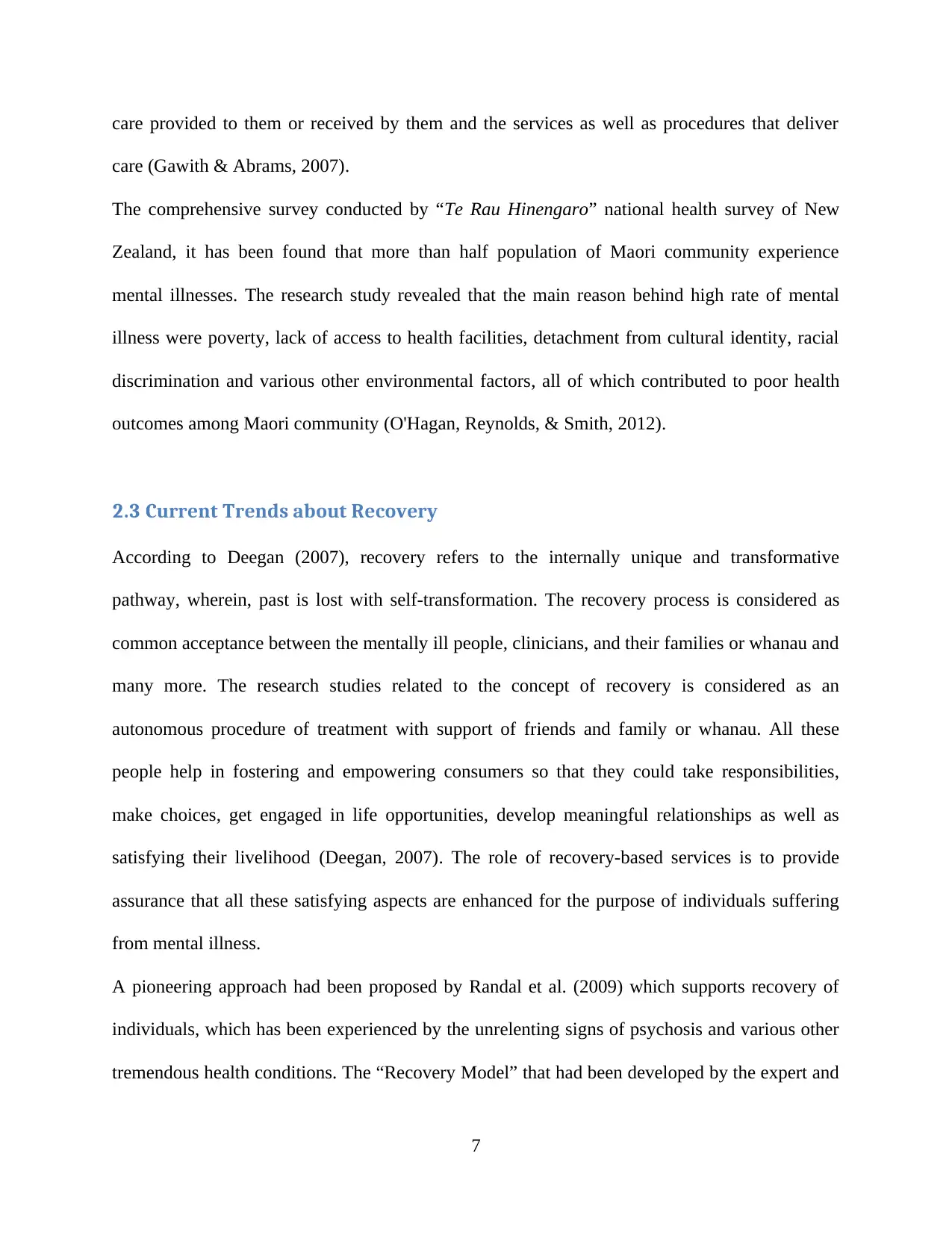
care provided to them or received by them and the services as well as procedures that deliver
care (Gawith & Abrams, 2007).
The comprehensive survey conducted by “Te Rau Hinengaro” national health survey of New
Zealand, it has been found that more than half population of Maori community experience
mental illnesses. The research study revealed that the main reason behind high rate of mental
illness were poverty, lack of access to health facilities, detachment from cultural identity, racial
discrimination and various other environmental factors, all of which contributed to poor health
outcomes among Maori community (O'Hagan, Reynolds, & Smith, 2012).
2.3 Current Trends about Recovery
According to Deegan (2007), recovery refers to the internally unique and transformative
pathway, wherein, past is lost with self-transformation. The recovery process is considered as
common acceptance between the mentally ill people, clinicians, and their families or whanau and
many more. The research studies related to the concept of recovery is considered as an
autonomous procedure of treatment with support of friends and family or whanau. All these
people help in fostering and empowering consumers so that they could take responsibilities,
make choices, get engaged in life opportunities, develop meaningful relationships as well as
satisfying their livelihood (Deegan, 2007). The role of recovery-based services is to provide
assurance that all these satisfying aspects are enhanced for the purpose of individuals suffering
from mental illness.
A pioneering approach had been proposed by Randal et al. (2009) which supports recovery of
individuals, which has been experienced by the unrelenting signs of psychosis and various other
tremendous health conditions. The “Recovery Model” that had been developed by the expert and
7
care (Gawith & Abrams, 2007).
The comprehensive survey conducted by “Te Rau Hinengaro” national health survey of New
Zealand, it has been found that more than half population of Maori community experience
mental illnesses. The research study revealed that the main reason behind high rate of mental
illness were poverty, lack of access to health facilities, detachment from cultural identity, racial
discrimination and various other environmental factors, all of which contributed to poor health
outcomes among Maori community (O'Hagan, Reynolds, & Smith, 2012).
2.3 Current Trends about Recovery
According to Deegan (2007), recovery refers to the internally unique and transformative
pathway, wherein, past is lost with self-transformation. The recovery process is considered as
common acceptance between the mentally ill people, clinicians, and their families or whanau and
many more. The research studies related to the concept of recovery is considered as an
autonomous procedure of treatment with support of friends and family or whanau. All these
people help in fostering and empowering consumers so that they could take responsibilities,
make choices, get engaged in life opportunities, develop meaningful relationships as well as
satisfying their livelihood (Deegan, 2007). The role of recovery-based services is to provide
assurance that all these satisfying aspects are enhanced for the purpose of individuals suffering
from mental illness.
A pioneering approach had been proposed by Randal et al. (2009) which supports recovery of
individuals, which has been experienced by the unrelenting signs of psychosis and various other
tremendous health conditions. The “Recovery Model” that had been developed by the expert and
7
Paraphrase This Document
Need a fresh take? Get an instant paraphrase of this document with our AI Paraphraser
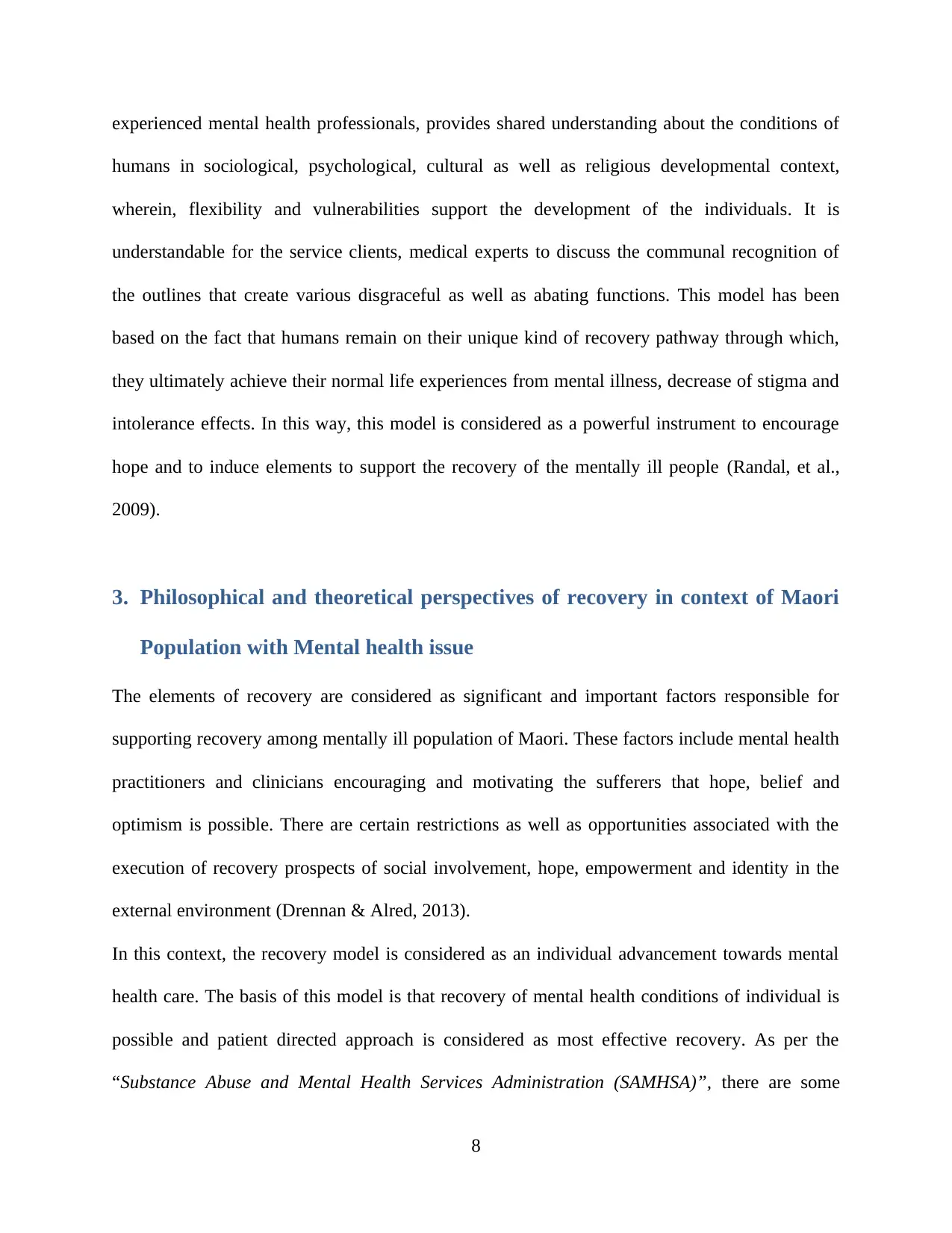
experienced mental health professionals, provides shared understanding about the conditions of
humans in sociological, psychological, cultural as well as religious developmental context,
wherein, flexibility and vulnerabilities support the development of the individuals. It is
understandable for the service clients, medical experts to discuss the communal recognition of
the outlines that create various disgraceful as well as abating functions. This model has been
based on the fact that humans remain on their unique kind of recovery pathway through which,
they ultimately achieve their normal life experiences from mental illness, decrease of stigma and
intolerance effects. In this way, this model is considered as a powerful instrument to encourage
hope and to induce elements to support the recovery of the mentally ill people (Randal, et al.,
2009).
3. Philosophical and theoretical perspectives of recovery in context of Maori
Population with Mental health issue
The elements of recovery are considered as significant and important factors responsible for
supporting recovery among mentally ill population of Maori. These factors include mental health
practitioners and clinicians encouraging and motivating the sufferers that hope, belief and
optimism is possible. There are certain restrictions as well as opportunities associated with the
execution of recovery prospects of social involvement, hope, empowerment and identity in the
external environment (Drennan & Alred, 2013).
In this context, the recovery model is considered as an individual advancement towards mental
health care. The basis of this model is that recovery of mental health conditions of individual is
possible and patient directed approach is considered as most effective recovery. As per the
“Substance Abuse and Mental Health Services Administration (SAMHSA)”, there are some
8
humans in sociological, psychological, cultural as well as religious developmental context,
wherein, flexibility and vulnerabilities support the development of the individuals. It is
understandable for the service clients, medical experts to discuss the communal recognition of
the outlines that create various disgraceful as well as abating functions. This model has been
based on the fact that humans remain on their unique kind of recovery pathway through which,
they ultimately achieve their normal life experiences from mental illness, decrease of stigma and
intolerance effects. In this way, this model is considered as a powerful instrument to encourage
hope and to induce elements to support the recovery of the mentally ill people (Randal, et al.,
2009).
3. Philosophical and theoretical perspectives of recovery in context of Maori
Population with Mental health issue
The elements of recovery are considered as significant and important factors responsible for
supporting recovery among mentally ill population of Maori. These factors include mental health
practitioners and clinicians encouraging and motivating the sufferers that hope, belief and
optimism is possible. There are certain restrictions as well as opportunities associated with the
execution of recovery prospects of social involvement, hope, empowerment and identity in the
external environment (Drennan & Alred, 2013).
In this context, the recovery model is considered as an individual advancement towards mental
health care. The basis of this model is that recovery of mental health conditions of individual is
possible and patient directed approach is considered as most effective recovery. As per the
“Substance Abuse and Mental Health Services Administration (SAMHSA)”, there are some
8
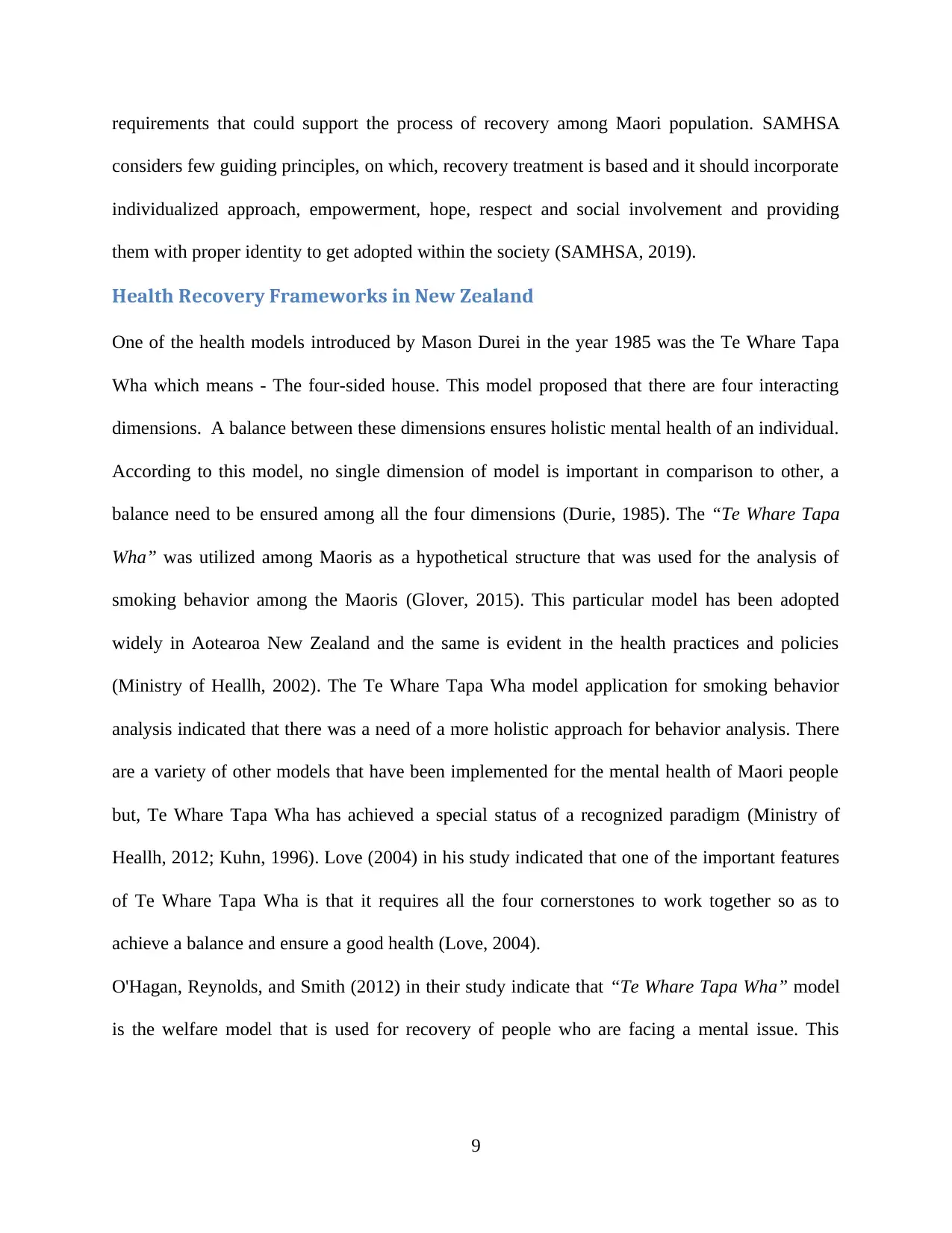
requirements that could support the process of recovery among Maori population. SAMHSA
considers few guiding principles, on which, recovery treatment is based and it should incorporate
individualized approach, empowerment, hope, respect and social involvement and providing
them with proper identity to get adopted within the society (SAMHSA, 2019).
Health Recovery Frameworks in New Zealand
One of the health models introduced by Mason Durei in the year 1985 was the Te Whare Tapa
Wha which means - The four-sided house. This model proposed that there are four interacting
dimensions. A balance between these dimensions ensures holistic mental health of an individual.
According to this model, no single dimension of model is important in comparison to other, a
balance need to be ensured among all the four dimensions (Durie, 1985). The “Te Whare Tapa
Wha” was utilized among Maoris as a hypothetical structure that was used for the analysis of
smoking behavior among the Maoris (Glover, 2015). This particular model has been adopted
widely in Aotearoa New Zealand and the same is evident in the health practices and policies
(Ministry of Heallh, 2002). The Te Whare Tapa Wha model application for smoking behavior
analysis indicated that there was a need of a more holistic approach for behavior analysis. There
are a variety of other models that have been implemented for the mental health of Maori people
but, Te Whare Tapa Wha has achieved a special status of a recognized paradigm (Ministry of
Heallh, 2012; Kuhn, 1996). Love (2004) in his study indicated that one of the important features
of Te Whare Tapa Wha is that it requires all the four cornerstones to work together so as to
achieve a balance and ensure a good health (Love, 2004).
O'Hagan, Reynolds, and Smith (2012) in their study indicate that “Te Whare Tapa Wha” model
is the welfare model that is used for recovery of people who are facing a mental issue. This
9
considers few guiding principles, on which, recovery treatment is based and it should incorporate
individualized approach, empowerment, hope, respect and social involvement and providing
them with proper identity to get adopted within the society (SAMHSA, 2019).
Health Recovery Frameworks in New Zealand
One of the health models introduced by Mason Durei in the year 1985 was the Te Whare Tapa
Wha which means - The four-sided house. This model proposed that there are four interacting
dimensions. A balance between these dimensions ensures holistic mental health of an individual.
According to this model, no single dimension of model is important in comparison to other, a
balance need to be ensured among all the four dimensions (Durie, 1985). The “Te Whare Tapa
Wha” was utilized among Maoris as a hypothetical structure that was used for the analysis of
smoking behavior among the Maoris (Glover, 2015). This particular model has been adopted
widely in Aotearoa New Zealand and the same is evident in the health practices and policies
(Ministry of Heallh, 2002). The Te Whare Tapa Wha model application for smoking behavior
analysis indicated that there was a need of a more holistic approach for behavior analysis. There
are a variety of other models that have been implemented for the mental health of Maori people
but, Te Whare Tapa Wha has achieved a special status of a recognized paradigm (Ministry of
Heallh, 2012; Kuhn, 1996). Love (2004) in his study indicated that one of the important features
of Te Whare Tapa Wha is that it requires all the four cornerstones to work together so as to
achieve a balance and ensure a good health (Love, 2004).
O'Hagan, Reynolds, and Smith (2012) in their study indicate that “Te Whare Tapa Wha” model
is the welfare model that is used for recovery of people who are facing a mental issue. This
9
⊘ This is a preview!⊘
Do you want full access?
Subscribe today to unlock all pages.

Trusted by 1+ million students worldwide
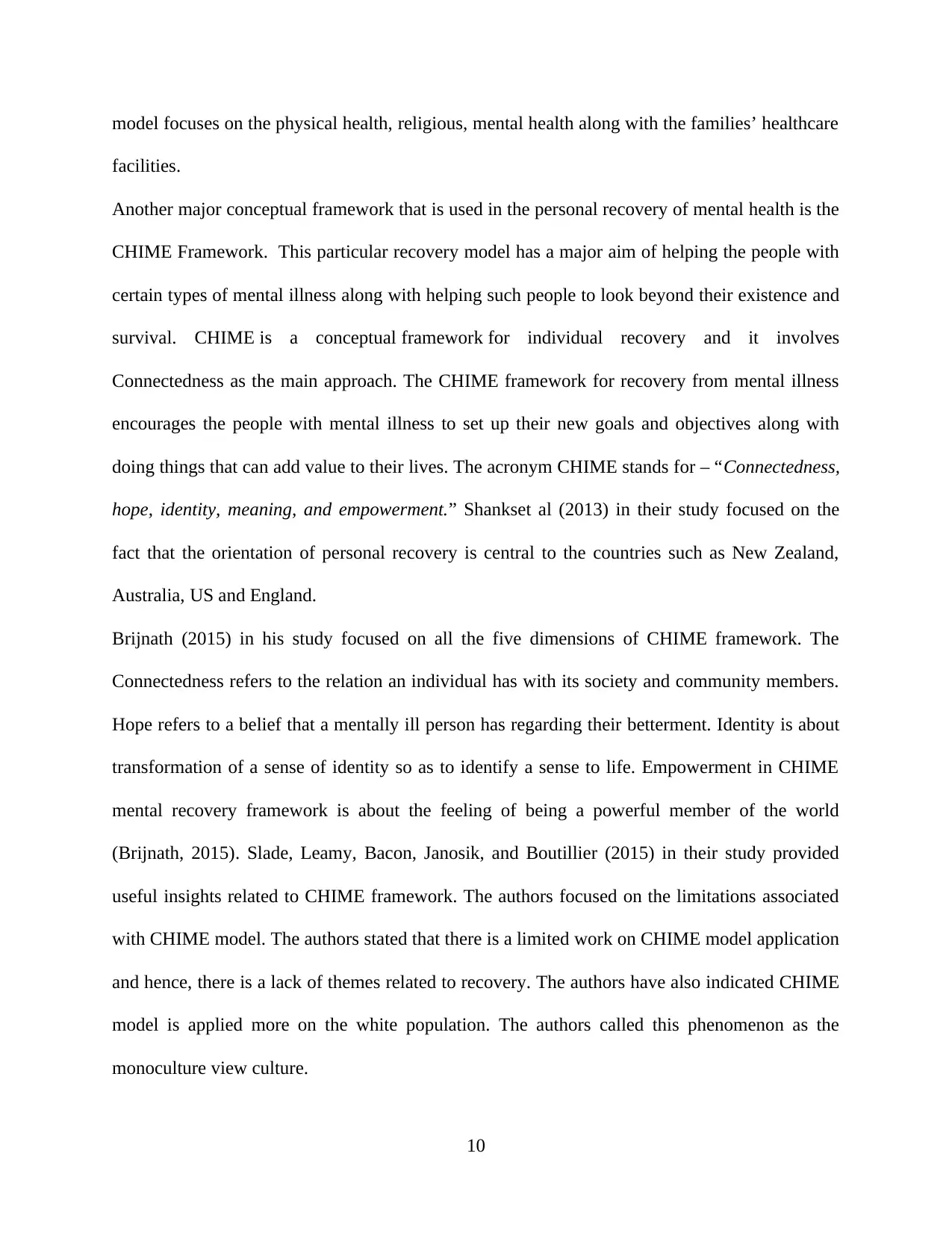
model focuses on the physical health, religious, mental health along with the families’ healthcare
facilities.
Another major conceptual framework that is used in the personal recovery of mental health is the
CHIME Framework. This particular recovery model has a major aim of helping the people with
certain types of mental illness along with helping such people to look beyond their existence and
survival. CHIME is a conceptual framework for individual recovery and it involves
Connectedness as the main approach. The CHIME framework for recovery from mental illness
encourages the people with mental illness to set up their new goals and objectives along with
doing things that can add value to their lives. The acronym CHIME stands for – “Connectedness,
hope, identity, meaning, and empowerment.” Shankset al (2013) in their study focused on the
fact that the orientation of personal recovery is central to the countries such as New Zealand,
Australia, US and England.
Brijnath (2015) in his study focused on all the five dimensions of CHIME framework. The
Connectedness refers to the relation an individual has with its society and community members.
Hope refers to a belief that a mentally ill person has regarding their betterment. Identity is about
transformation of a sense of identity so as to identify a sense to life. Empowerment in CHIME
mental recovery framework is about the feeling of being a powerful member of the world
(Brijnath, 2015). Slade, Leamy, Bacon, Janosik, and Boutillier (2015) in their study provided
useful insights related to CHIME framework. The authors focused on the limitations associated
with CHIME model. The authors stated that there is a limited work on CHIME model application
and hence, there is a lack of themes related to recovery. The authors have also indicated CHIME
model is applied more on the white population. The authors called this phenomenon as the
monoculture view culture.
10
facilities.
Another major conceptual framework that is used in the personal recovery of mental health is the
CHIME Framework. This particular recovery model has a major aim of helping the people with
certain types of mental illness along with helping such people to look beyond their existence and
survival. CHIME is a conceptual framework for individual recovery and it involves
Connectedness as the main approach. The CHIME framework for recovery from mental illness
encourages the people with mental illness to set up their new goals and objectives along with
doing things that can add value to their lives. The acronym CHIME stands for – “Connectedness,
hope, identity, meaning, and empowerment.” Shankset al (2013) in their study focused on the
fact that the orientation of personal recovery is central to the countries such as New Zealand,
Australia, US and England.
Brijnath (2015) in his study focused on all the five dimensions of CHIME framework. The
Connectedness refers to the relation an individual has with its society and community members.
Hope refers to a belief that a mentally ill person has regarding their betterment. Identity is about
transformation of a sense of identity so as to identify a sense to life. Empowerment in CHIME
mental recovery framework is about the feeling of being a powerful member of the world
(Brijnath, 2015). Slade, Leamy, Bacon, Janosik, and Boutillier (2015) in their study provided
useful insights related to CHIME framework. The authors focused on the limitations associated
with CHIME model. The authors stated that there is a limited work on CHIME model application
and hence, there is a lack of themes related to recovery. The authors have also indicated CHIME
model is applied more on the white population. The authors called this phenomenon as the
monoculture view culture.
10
Paraphrase This Document
Need a fresh take? Get an instant paraphrase of this document with our AI Paraphraser
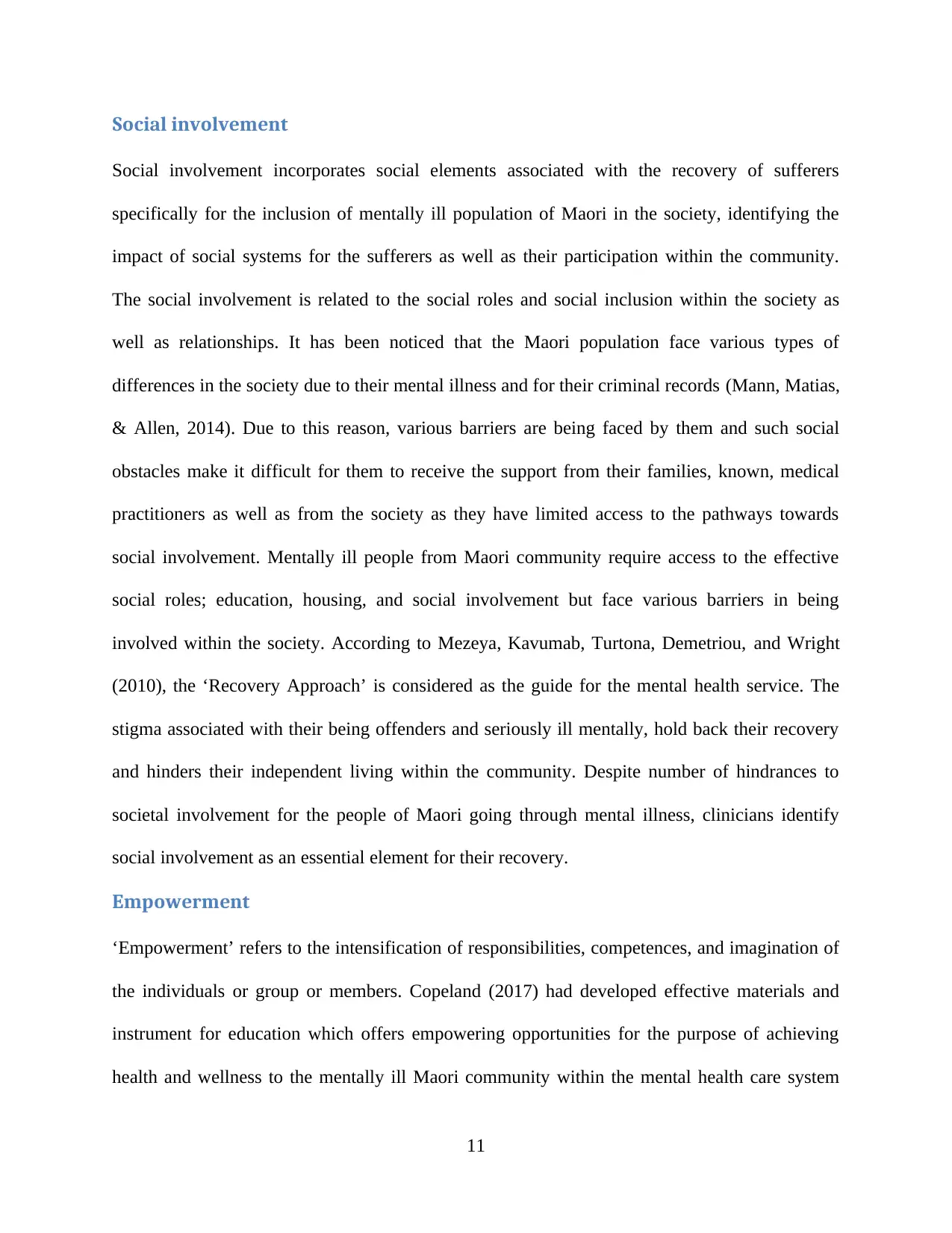
Social involvement
Social involvement incorporates social elements associated with the recovery of sufferers
specifically for the inclusion of mentally ill population of Maori in the society, identifying the
impact of social systems for the sufferers as well as their participation within the community.
The social involvement is related to the social roles and social inclusion within the society as
well as relationships. It has been noticed that the Maori population face various types of
differences in the society due to their mental illness and for their criminal records (Mann, Matias,
& Allen, 2014). Due to this reason, various barriers are being faced by them and such social
obstacles make it difficult for them to receive the support from their families, known, medical
practitioners as well as from the society as they have limited access to the pathways towards
social involvement. Mentally ill people from Maori community require access to the effective
social roles; education, housing, and social involvement but face various barriers in being
involved within the society. According to Mezeya, Kavumab, Turtona, Demetriou, and Wright
(2010), the ‘Recovery Approach’ is considered as the guide for the mental health service. The
stigma associated with their being offenders and seriously ill mentally, hold back their recovery
and hinders their independent living within the community. Despite number of hindrances to
societal involvement for the people of Maori going through mental illness, clinicians identify
social involvement as an essential element for their recovery.
Empowerment
‘Empowerment’ refers to the intensification of responsibilities, competences, and imagination of
the individuals or group or members. Copeland (2017) had developed effective materials and
instrument for education which offers empowering opportunities for the purpose of achieving
health and wellness to the mentally ill Maori community within the mental health care system
11
Social involvement incorporates social elements associated with the recovery of sufferers
specifically for the inclusion of mentally ill population of Maori in the society, identifying the
impact of social systems for the sufferers as well as their participation within the community.
The social involvement is related to the social roles and social inclusion within the society as
well as relationships. It has been noticed that the Maori population face various types of
differences in the society due to their mental illness and for their criminal records (Mann, Matias,
& Allen, 2014). Due to this reason, various barriers are being faced by them and such social
obstacles make it difficult for them to receive the support from their families, known, medical
practitioners as well as from the society as they have limited access to the pathways towards
social involvement. Mentally ill people from Maori community require access to the effective
social roles; education, housing, and social involvement but face various barriers in being
involved within the society. According to Mezeya, Kavumab, Turtona, Demetriou, and Wright
(2010), the ‘Recovery Approach’ is considered as the guide for the mental health service. The
stigma associated with their being offenders and seriously ill mentally, hold back their recovery
and hinders their independent living within the community. Despite number of hindrances to
societal involvement for the people of Maori going through mental illness, clinicians identify
social involvement as an essential element for their recovery.
Empowerment
‘Empowerment’ refers to the intensification of responsibilities, competences, and imagination of
the individuals or group or members. Copeland (2017) had developed effective materials and
instrument for education which offers empowering opportunities for the purpose of achieving
health and wellness to the mentally ill Maori community within the mental health care system
11
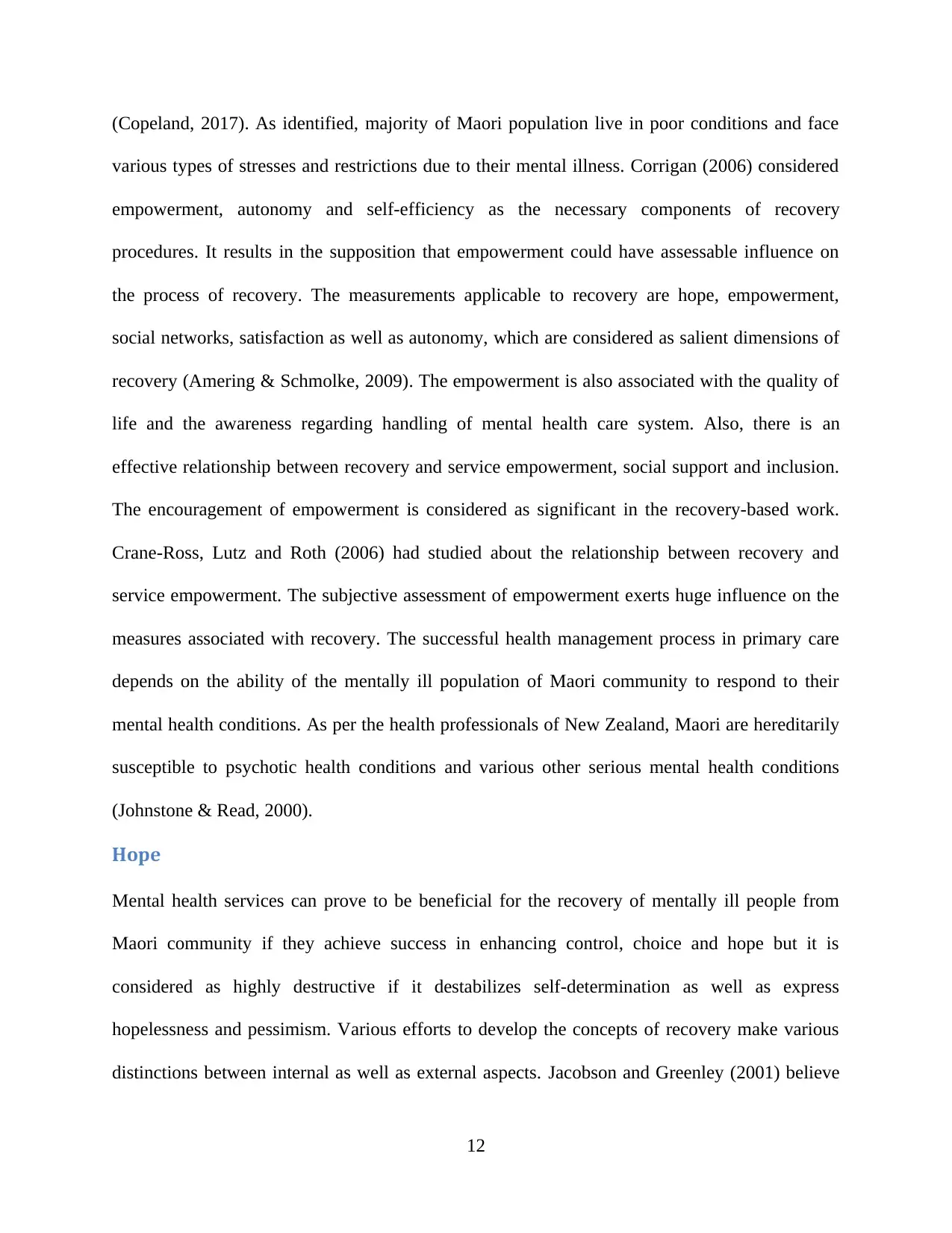
(Copeland, 2017). As identified, majority of Maori population live in poor conditions and face
various types of stresses and restrictions due to their mental illness. Corrigan (2006) considered
empowerment, autonomy and self-efficiency as the necessary components of recovery
procedures. It results in the supposition that empowerment could have assessable influence on
the process of recovery. The measurements applicable to recovery are hope, empowerment,
social networks, satisfaction as well as autonomy, which are considered as salient dimensions of
recovery (Amering & Schmolke, 2009). The empowerment is also associated with the quality of
life and the awareness regarding handling of mental health care system. Also, there is an
effective relationship between recovery and service empowerment, social support and inclusion.
The encouragement of empowerment is considered as significant in the recovery-based work.
Crane-Ross, Lutz and Roth (2006) had studied about the relationship between recovery and
service empowerment. The subjective assessment of empowerment exerts huge influence on the
measures associated with recovery. The successful health management process in primary care
depends on the ability of the mentally ill population of Maori community to respond to their
mental health conditions. As per the health professionals of New Zealand, Maori are hereditarily
susceptible to psychotic health conditions and various other serious mental health conditions
(Johnstone & Read, 2000).
Hope
Mental health services can prove to be beneficial for the recovery of mentally ill people from
Maori community if they achieve success in enhancing control, choice and hope but it is
considered as highly destructive if it destabilizes self-determination as well as express
hopelessness and pessimism. Various efforts to develop the concepts of recovery make various
distinctions between internal as well as external aspects. Jacobson and Greenley (2001) believe
12
various types of stresses and restrictions due to their mental illness. Corrigan (2006) considered
empowerment, autonomy and self-efficiency as the necessary components of recovery
procedures. It results in the supposition that empowerment could have assessable influence on
the process of recovery. The measurements applicable to recovery are hope, empowerment,
social networks, satisfaction as well as autonomy, which are considered as salient dimensions of
recovery (Amering & Schmolke, 2009). The empowerment is also associated with the quality of
life and the awareness regarding handling of mental health care system. Also, there is an
effective relationship between recovery and service empowerment, social support and inclusion.
The encouragement of empowerment is considered as significant in the recovery-based work.
Crane-Ross, Lutz and Roth (2006) had studied about the relationship between recovery and
service empowerment. The subjective assessment of empowerment exerts huge influence on the
measures associated with recovery. The successful health management process in primary care
depends on the ability of the mentally ill population of Maori community to respond to their
mental health conditions. As per the health professionals of New Zealand, Maori are hereditarily
susceptible to psychotic health conditions and various other serious mental health conditions
(Johnstone & Read, 2000).
Hope
Mental health services can prove to be beneficial for the recovery of mentally ill people from
Maori community if they achieve success in enhancing control, choice and hope but it is
considered as highly destructive if it destabilizes self-determination as well as express
hopelessness and pessimism. Various efforts to develop the concepts of recovery make various
distinctions between internal as well as external aspects. Jacobson and Greenley (2001) believe
12
⊘ This is a preview!⊘
Do you want full access?
Subscribe today to unlock all pages.

Trusted by 1+ million students worldwide
1 out of 20
Related Documents
Your All-in-One AI-Powered Toolkit for Academic Success.
+13062052269
info@desklib.com
Available 24*7 on WhatsApp / Email
![[object Object]](/_next/static/media/star-bottom.7253800d.svg)
Unlock your academic potential
Copyright © 2020–2025 A2Z Services. All Rights Reserved. Developed and managed by ZUCOL.




